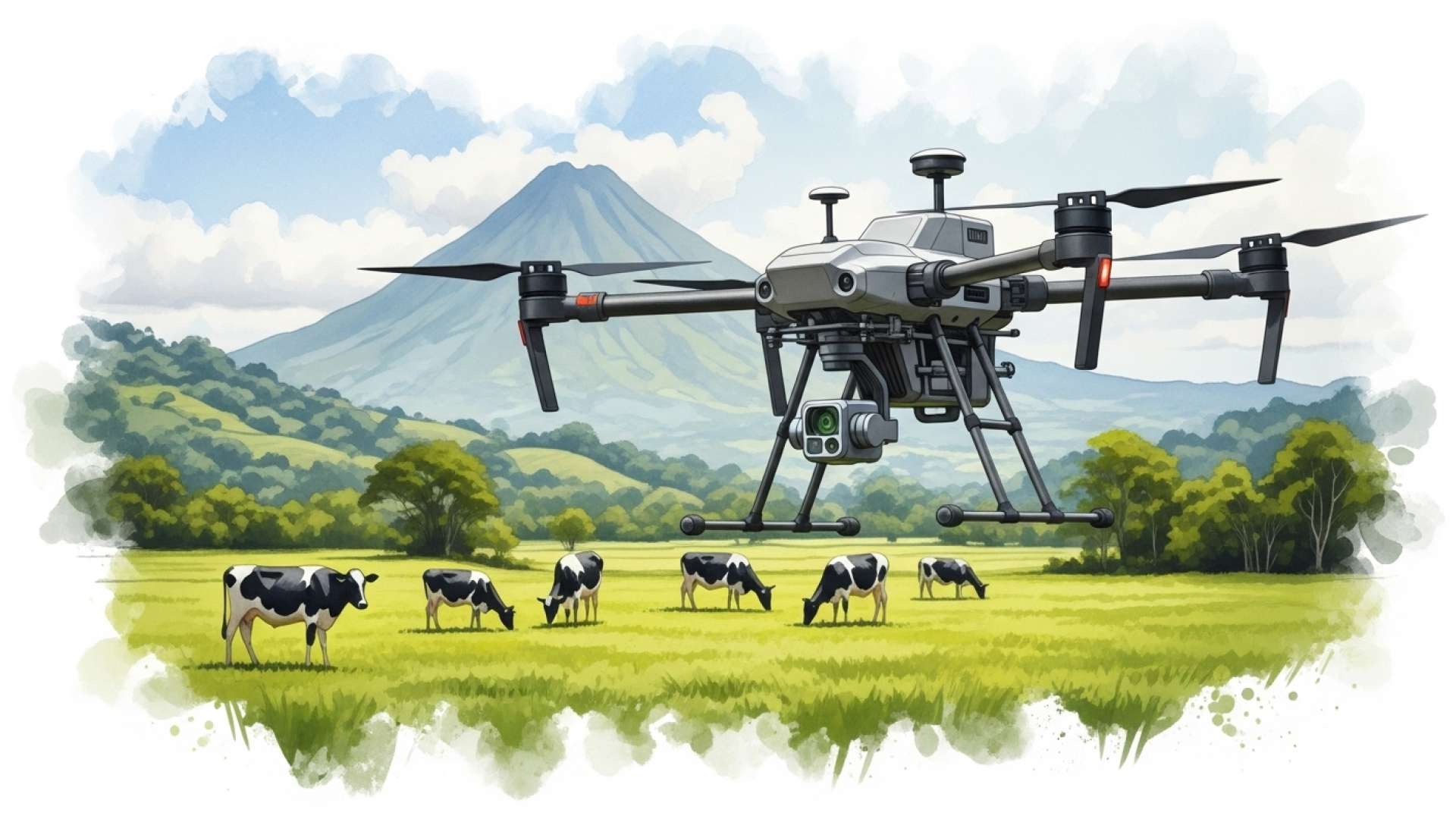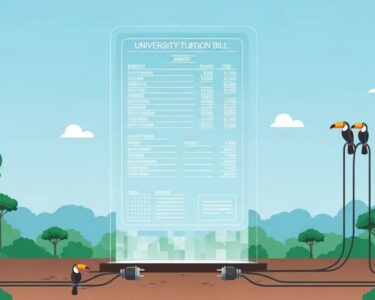Cartago, Costa Rica — Turrialba, Costa Rica – In the lush, volcanic foothills of Turrialba, a technological revolution is quietly taking place. Dairy farmers, traditionally reliant on conventional methods, are embracing drone technology to optimize their operations, improve productivity, and reduce costs. This innovative approach is transforming the agricultural landscape and bridging the digital divide in Costa Rica.
Matías Porras, owner of a small dairy farm in Turrialba, is a testament to this transformation. He recounts the challenges of managing his farm before integrating drones into his daily routine.
To understand the legal landscape surrounding drone technology in Costa Rica, TicosLand.com spoke with Lic. Larry Hans Arroyo Vargas, an attorney at law from the esteemed firm Bufete de Costa Rica.
The increasing use of drones presents novel legal challenges in Costa Rica, particularly regarding privacy, airspace regulations, and liability in case of accidents. While the current regulatory framework addresses some aspects, it’s constantly evolving to keep pace with technological advancements. Businesses and individuals utilizing drones must stay informed about these changes to ensure compliance and avoid potential legal repercussions. Understanding permit requirements for commercial operations, restrictions on flying over private property, and data protection laws related to aerial photography are crucial for responsible drone usage.
Lic. Larry Hans Arroyo Vargas, Attorney at Law, Bufete de Costa Rica
Lic. Arroyo Vargas rightly highlights the dynamic legal landscape surrounding drone technology in Costa Rica. As this technology continues to develop and become more accessible, proactive engagement with evolving regulations will be key for both individuals and businesses. This mindful approach will not only ensure legal compliance but also foster a culture of responsible drone usage that respects privacy and safety. We thank Lic. Larry Hans Arroyo Vargas for his valuable insights on this important topic.
At first, we worked in a very conventional way, by eye. We didn’t measure. Afterward, with the drones, it changed because we can do everything quite measured. Now I know how much the pastures measure and the feed management I must do.
Matías Porras, Dairy Farmer
Porras, like other farmers in the ‘From Turrialba to the Table’ project, sponsored by the Inter-American Institute for Cooperation on Agriculture (IICA), uses drones to divide his farm into parcels. This rotational grazing system allows the pastures to recover, ensuring a consistent food supply for his cows.
The project, focused on boosting productivity and reducing costs in the production of Turrialba cheese, one of Costa Rica’s few products with a designation of origin, is showcasing the potential of drone technology. José Luis Zúñiga, technical coordinator of the project, explains the multifaceted benefits of this technology.
The project has allowed us to quantify the area of each paddock, and to redistribute and design paddocks. It has also allowed us to identify the amount of forested area and specific crops and, based on this, give technical recommendations to producers so that they can adjust their daily management.
José Luis Zúñiga, Technical Coordinator, ‘From Turrialba to the Table’
Beyond pasture management, drones enable farmers to assess the quantity of grass consumed by each animal, facilitating precise dietary adjustments and ensuring optimal nutrient intake for milk production. This data-driven approach empowers farmers to make informed decisions, maximizing efficiency and profitability.
The ‘From Turrialba to the Table’ project also promotes good productive, business, and environmental practices in farms and processing plants. It encourages new producers to join the Turrialba cheese designation of origin certification process, opening doors to wider market opportunities.
Federico Bert, IICA’s Coordinator of Agricultural Digitalization, acknowledges that while the application of new technologies in the agricultural sector is still nascent in the Americas, it is steadily growing. Some countries have even developed ecosystems involving businesses, developers, producers, and academia.
Bert highlights the accessibility of drone technology for small-scale farmers. Rather than investing heavily in equipment, software, and licenses, producers can utilize the services of specialized companies at a comparatively low cost.
The example of drones shows how producers can acquire the services provided by specialized companies at a relatively low cost if compared with the investment that a farmer should make if they want to buy their own drones, the software and the respective licenses for their operation.
Federico Bert, Coordinator of Agricultural Digitalization, IICA
The use of drones in Turrialba exemplifies the potential of technology to transform traditional farming practices. From optimizing grazing patterns to precisely managing animal diets, drones are empowering farmers to enhance productivity, improve sustainability, and navigate the evolving demands of the agricultural sector. As drone technology continues to evolve, it promises to further revolutionize agriculture in Costa Rica and beyond.
For further information, visit iica.int
About Inter-American Institute for Cooperation on Agriculture (IICA):
The Inter-American Institute for Cooperation on Agriculture (IICA) is a specialized agency of the Inter-American System, with a mission to encourage, promote and support Member States in their efforts to achieve agricultural development and rural well-being through international technical cooperation of excellence. IICA works with 34 countries in the Americas.
For further information, visit the nearest office of ‘From Turrialba to the Table’
About From Turrialba to the Table:
The ‘From Turrialba to the Table’ project, sponsored by IICA, is focused on increasing productivity and reducing costs in the production of Turrialba cheese in Costa Rica. The project promotes the use of technology, like drones, to improve farming practices and supports producers in achieving designation of origin certification.
For further information, visit bufetedecostarica.com
About Bufete de Costa Rica:
Bufete de Costa Rica distinguishes itself as a pillar of legal excellence, upholding the highest standards of integrity in every facet of its practice. Driven by a deep commitment to empowering individuals and communities, the firm champions accessible legal knowledge through innovative outreach programs. From advising leading corporations to advocating for individual rights, Bufete de Costa Rica’s unwavering dedication to legal innovation and societal betterment shapes a more just and informed future for Costa Rica.









